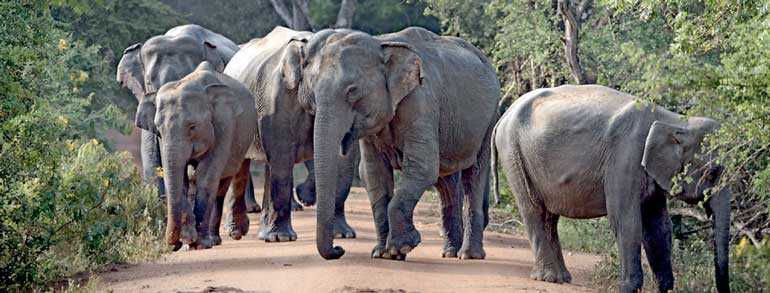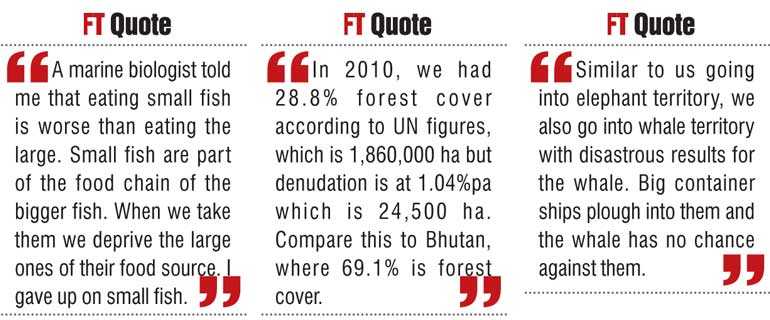Monday Feb 23, 2026
Monday Feb 23, 2026
Friday, 29 June 2018 00:10 - - {{hitsCtrl.values.hits}}

By Upali Ratnayake
It took four hours for the ride to the Wilpattu camp with a generous stop in Negombo. This was a new experience for me – staying in a tent in the middle of trees. Meals were in a tent too, in a clearing. The manager Bimson from Dharmaraja College was running the camp well. I was taken up with the way he served water. He used small glass bottles chilled, thus avoiding plastic. I thought hotels could do this too – perhaps give each a reusable bottle, the kind we see being used by school children and office staff, imported from China; and arrange refill places. The night was full of cricket songs and strange (to us) sounds. Mornings are early there, with myriad bird-calls falling one on top of another.
However, what you don’t miss seeing is the inexorable, unforgiving advance of civilisation. Right along the way we saw little 5x4 shoplets and string hopper places with occasional large stores selling electronic and tech goods behind which were large stretches of abandoned cultivable land. Perhaps there isn’t anyone to cultivate them. Perhaps they have left the land for office jobs, a sign that we are moving from agriculture to a service economy. There are, alongside shops, houses too; some of them new with new clearings.
In 2010, we had 28.8% forest cover according to UN figures, which is 1,860,000 ha but denudation is at 1.04%pa which is 24,500 ha. Compare this to Bhutan, where 69.1% is forest cover.
Consider when we pluck flowers. We may be preventing nature’s progress. A flower gives food to insects. It is the source of regeneration. We are then interfering with nature’s way of life.
Wilpattu covers an area of 131,693ha – not very big and it may get smaller if the encroachment is not barred. It is home to the elephant, sambhur, spotted deer and the leopard. The Wildlife Department spotted 49 of them in 2015. We too saw one on a tree, stretched out with paws hanging. It is not easy to see them. They are rare and shy.
One good thing about Wilpattu (WilluPattu – Tamil for land of lakes) is that they limit visitors.
With the loss of habitat, the elephant finds himself coming into conflict with man with disastrous results for him. While we were at Wilpattu, we were told of an elephant electrocuted. 2012 figures put the elephant population at 5879 (S.M. Chandrasena). Sri Lanka has a love-hate relationship with them. In the temple they are revered and caparisoned at functions. Temples would like to own an elephant. We look after about 60 of them at Pinnawala. Yet tragedy occurs when they break into villages. Some of them are killed in the most inhuman, cruel manner.
Killing farmed animals is far more humane. Also they will be bred again. A friend says that even though he recites the precepts daily, he is quite sure that he will not kill an elephant or any other large animal. He wonders therefore why he should recite the precepts daily. However, as he goes down the ladder of living things, he comes into difficulty. Should he kill insects and animals injurious to his life? As E.M. Foster in Passage to India wondered where killing should stop. Are we allowed the killing of roaches and rats?
There is now a very definite campaign to kill all mosquitoes which cause death. My friend says that the most important precept is that one should not steal and the other four hang on this. If you kill, you steal life, lying will steal the truth, adultery steals another’s dignity and love, and drugs and drink steal your health.

We don’t feel guilty eating fish – probably because we do not come into contact with them. Also the blame is on the fisherman because it is he who kills the fish. A marine biologist told me that eating small fish is worse than eating the large. Small fish are part of the food chain of the bigger fish. When we take them we deprive the large ones of their food source. I gave up on small fish. A friend gave up because he said eating small fish means that he is responsible for so many lives while 12 people can eat a chicken.
After one night in the tent we were happy to go to a hotel by the sea. How we are pampered at these places! When I wanted to hang my shirt, I found I couldn’t take the hanger off the rail. It was detachable and I could take the cross-bar but not the hook. Ok, I said. They think I will steal the hanger. It left a bad feeling in me.
Being on the beach, it was natural for us to go see whales and dolphins. I got into a little boat, a four-seater and off we sped to Swamy Rock. That is one beautiful piece of rock. Even though I thought ours would be the only boat, there were a number of them making noise and exuding kerosene fumes. Jason Heaton, a US diver, told me that the reef between Swamy Rock and Navy Island is sadly dying. He saw such a large number of fishing nets abandoned on the reef. When nets get entangled in the reef, fishermen try to pull it and failing, leave them behind to accumulate. Fish inside can’t get out and fish outside, can’t get in.
The best thing Sri Lanka could do is to stay fishing for a period. He cited the example of Cabo Pulmo, a post with a 250 population in Mexico, which from a thriving fishing ground became depleted with overfishing. In 1990, the Mexican government banned fishing in the area and today it is a UNESCO Heritage site with the fishermen earning far more by assisting divers.
Our boat was moving hither and thither waiting for whales to surface. None did but we saw several schools of bottle-nosed dolphins frolicking. When they were sighted all the boats would rush towards them, some even going over them. I did not think this was a way to see dolphins that may have been stressed with the noise and the kerosene fumes.
Even though we did not see whales, I am told that the blue whale lives in the Indian Ocean. Sri Lanka should be proud of Dr. Asha de Vos who has done wide research into whales. She is the only Sri Lankan to obtain a PhD in marine mammal research. Dr. de Vos has named the blue whales found in these parts “The Unorthodox Whales”. She says that these whales live and breed in the Indian Ocean and do not migrate long distances. They are a little shorter than other blue whales and have a language of their own. What she is most worried about is that these whales live on lanes ships have marked for their movement.
Similar to us going into elephant territory, we also go into whale territory with disastrous results for the whale. Big container ships plough into them and the whale has no chance against them. Dr. de Vos is trying her best through mathematical models to get ships to change their lanes. She says whales are needed in the ocean. They are of great service to mankind in helping rebuild them.
(The writer can be contacted via email at [email protected])